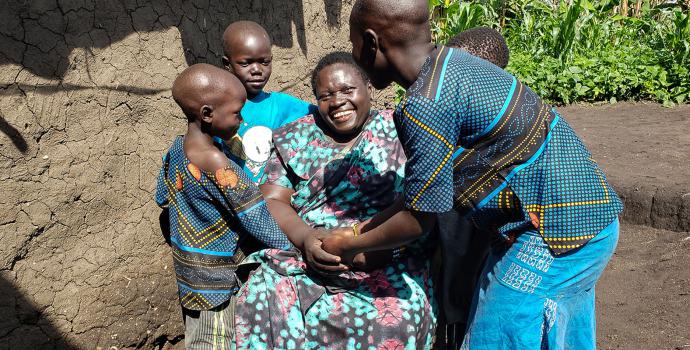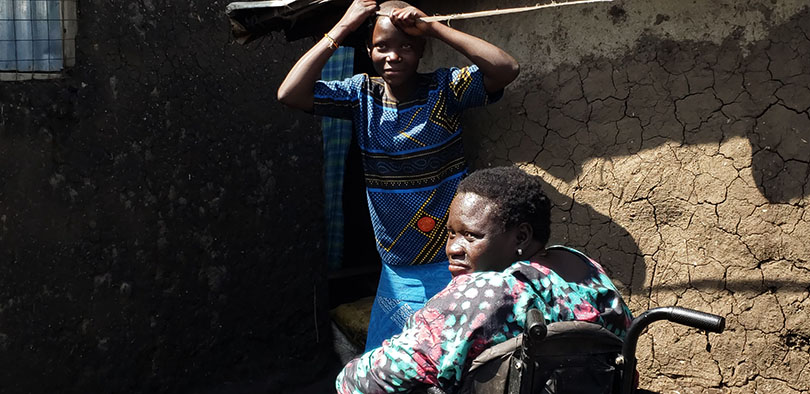“WE NO LONGER SLEEP IN A WET HOUSE WHEN IT RAINS” DORCAS, A MOTHER OF FOUR

Dorcas enjoys a light moment with four of her children at their home in Kyaka II Refugee Settlement in southwestern Uganda.
When you arrive at 38-year-old Dorcas’s home in Kyaka II Refugee Settlement, Kyegegwa District, it might be difficult for you to know the life of adversity she and her children have lived. Dorcas welcomes you with a wide smile as she would to a friend she has not seen in a while. Dorcas and her five children are among the many families Save the Children supports in the child protection project, Access to Protection, Empowerment, Accountability, and Leadership (APEAL).
Their Uganda story starts on August 6, 2018, when they arrive in Uganda at Ntoroko Transit Centre after fleeing conflict in DR Congo. The family was relocated to Kyaka II in September of that year.
Despite fleeing conflict, Dorcas and her children were yet to face other problems. The lack of shelter, food, clothes, and other basic necessities. The family lived in a makeshift tarpaulin where both boys and girls shared the same mat.
“Whenever it would rain, the tarpaulin would leak and sometimes the water would fill the house and we spend the night standing,” Dorcas says.
The situation was worsened by her physical impairment which made it difficult for her to fend for her children. Dorcas’s legs are crippled and she crawls on the ground.
But the family’s ray of hope came through 7-year-old Juliet*, who Save the Children identified from the Child-Friendly Centre as a child at risk.
“On conducting a home visit, it was discovered that the family, and especially the children, were at risk of child protection issues. We discovered their mother was physically impaired, the family had no decent shelter, the children were sharing a mat and they lacked all basic needs,” says Christine Birungi, a child protection coordinator on the APEAL project. “We had to support the family immediately.”
A joint monitoring exercise by SCI, OPM (Office of prime minister), and the district probation officer, recommended shelter for the family. Construction materials including poles, reeds, iron sheets, and nails were provided. Working with community structures, CPC (child protection committee), and church members, Juliet’s family was supported to construct a decent shelter.
Save the Children further supported the family with clothes, and beddings and further referred them to DRC, a partner in the APEAL consortium, for livelihood support. The children were referred to Windle Trust International for educational support. Dorcas also received a wheelchair from Humanity & Inclusion that is making movement around her home easier.
“I am so happy that my life has changed for the better. I pray that my children can complete school and get jobs,” Dorcas said.

Dorcas seated in her wheelchair. She received it from Humanity and Inclusion, one of Save the Childrens partners on APEAL consortium.
Save the Children with funding from European Union Humanitarian Aid has been implementing the APEAL project in Kyaka II, Kyangwali, and Imvepi refugee settlements, in Kyegegwa, Kikube and Terego districts, ensuring that children are protected from any form of abuse. The project is implemented alongside 10 partners including TPO, Days for Girls, and Care International, among others.
Child protection concerns are identified through community structures including child protection committees, peer-to-peers, and refugee welfare committees. Last year, 14,527, children benefited from age, gender, and culturally appropriate case management services in Kyaka II, Kyangwali, and Imvepi settlements, and 14,527 between May and July 2022.
Today, Dorcas’s children go to school and she operates a small business that has greatly contributed to the livelihood of the family.
“I am so so happy that God has provided for us and I can go to school and sleep well at night,” said Juliet.
Save the Children continues to monitor Dorcas’ family and other families in the settlements to identify and address any child protection concerns and refer those the organisation does not handle to partner agencies for support.
*Names have been changed to protect identities